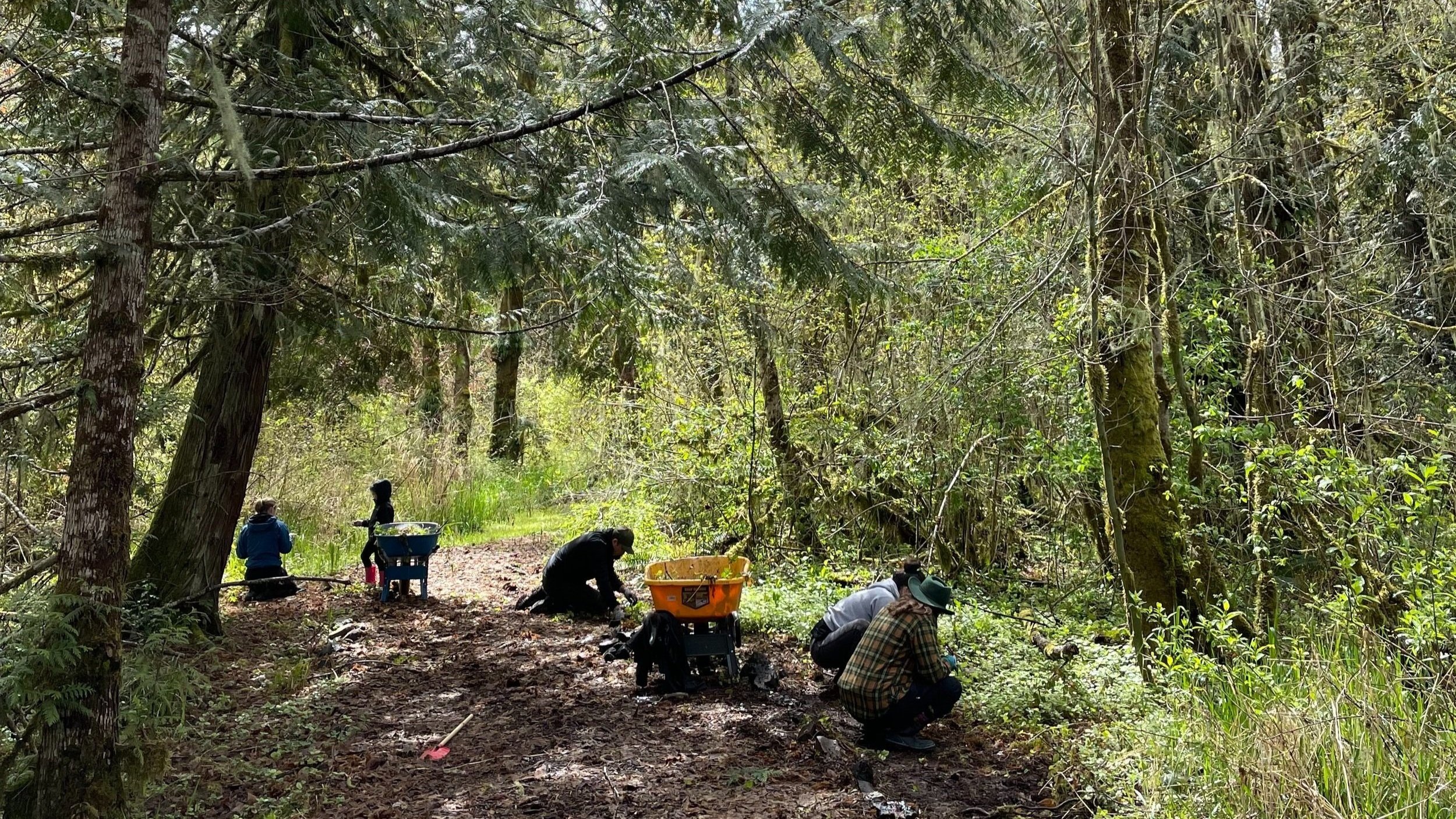
BIPOC Farmer
Oral History Project
The BIPOC Farmer Oral History Project is a partnership between our chapter, faculty members and students at The Evergreen State College, and the farmers themselves. This project is part of our Equity, Inclusion & Justice Commitments.
During the 2020-21 academic year, former board member Loretta Seppanen collaborated with students who were interested in learning the stories behind farms run by Black, Indigenous, and People of Color in the South Sound region.
Loretta paired students with farmers and Evergreen faculty provided guidance for students to help them listen and capture the stories of these farmers through an oral history interviewing approach.
Our goal was to encourage a rich connection between students and farmers and to amplify their stories here, on our site, so people can learn more about historical and present-day farmers of color in our region.
Trail maintenance at the Squaxin Island Tribe’s Salish Roots Farm.
Michelle Weeks
x̌ast sq̓it Farm (Good Rain Farm)
A sngaytskstx (Sinixt) tribal member of the Arrow Lakes Peoples, Michelle grows foods such as Hopi blue corn, gourd seed corn, and Makah Ozette, a type of potato listed on the Slow Food Ark of Taste.
Mercy Kairuki-McGee
Haki Farmers Collective
Mercy brings her Kenyan farming experience to the community through the Haki Farmers Collective.
Nakia DeMiero
Northwest Indian Treatment Center
A descendant of the Santa Clara and Isleta Pueblos tribes in New Mexico, Nakia works with gardened and gathered plant and herb medicines.
Debbie Leung
formerly of Ninth Heaven Herbs & Vegetables
Asian American farmer Debbie Leung grew and sold bok choy, Chinese broccoli, and other produce at the Olympia Farmers Market from the mid-1980s until early in this century.
Jesus Echeverria
Rancho Durango
Jesus, an immigrant from Mexico, started Rancho Durango in 1992. He and his family run the farm, which is located just west of Shelton.
Oral History Presentations
June 10, 2021
At a virtual event, two Evergreen students presented the stories they learned from four BIPOC farmers in our region. Click the link below to see the event. We didn't capture the beginning of the event in the recording, so here is Loretta's introduction:
Thank you for participating in this Slow Food event to learn more about Black, Indigenous, People of Color farmers and gardeners in our community. Our focus tonight is on four such individuals in stories told by two TESC students. Let me make several acknowledgements before I turn this over to the students:
I want to acknowledge the people who managed this land for many thousands of years before any Europeans came here and who continue their stewardship of the land and water. I think of myself as being on the land of the Nisqually, Squaxin, Chehalis, and Cowlitz people. Two of our farmers grow their food beyond on lands of the Clackamas Chinook and Skokomish people. I acknowledge that land stewardship as well.
This Slow Food project is part of our effort to increase our knowledge of the thousands of years of food production and preparation of the peoples of this area. Two of our farmers immigrated to this land. I acknowledge the value to us they bring from the farming knowledge of their home countries.
I thank the faculty, Brad Proctor and Prita Lal, who shared their expertise in 21st century qualitative research, expertise better fit for recognizing cultural difference than in my college days. My part of the project was to share basic oral history tools that I learned from one of tonight’s audience members, Elaine Vradenburgh. Elaine offers a class for community members that covers the tools, ethics, and rewards from the deep listening required for oral history work.
I also acknowledge the willingness of the farmers and gardeners for offering their time and their openness in the interviews conducted by Ellie Kravit-Smith and Amanda Flegel.
The program began with a narrative created by Ellie introducing Jesus Echeverria, Rancho Durango, Shelton. You can read the first part of Ellie's presentation about Jesus Echeverria of Rancho Durango in the written version of their oral history narrative beneath his name.
Following the Echeverria narrative, Amanda shared her interview with Michelle Weeks at a farm in Gresham, Oregon. Technology failed us for a few seconds during Amanda’s reading of this narrative. Ellie shared the interview with Mercy Kairuki-McGee, Olympia next. Amanda closed the program with her interview with Nakia DeMiero gardening at Northwest Indian Treatment Center. Again, due to technical problems a few words were lost in several portions of the reading.
Current and Historic Regional BIPOC Farmers
As part of the above project, Loretta and others compiled a partial list of Black, Indigenous, and People of Color who are farming or have farmed in this area. This list was compiled in the spring of 2021. Email us with any updates. We'd love to grow this list.






